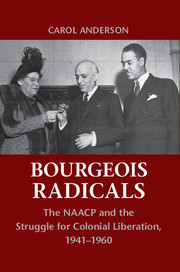Book contents
- Frontmatter
- Dedication
- Contents
- List of Figures
- Acknowledgments
- Introduction De-Centering Du Bois
- 1 Rising Wind
- 2 “The White Man’s Burden Has Not Been Very Heavy”
- 3 “An Even Larger Issue Than ‘Containing Communism’”
- 4 So Weak, So Seventeenth Century
- 5 Regime Change
- Conclusion Beyond the Single Story
- Bibliography
- Index
- References
3 - “An Even Larger Issue Than ‘Containing Communism’”
The NAACP and the Italian Colonies
Published online by Cambridge University Press: 05 December 2014
- Frontmatter
- Dedication
- Contents
- List of Figures
- Acknowledgments
- Introduction De-Centering Du Bois
- 1 Rising Wind
- 2 “The White Man’s Burden Has Not Been Very Heavy”
- 3 “An Even Larger Issue Than ‘Containing Communism’”
- 4 So Weak, So Seventeenth Century
- 5 Regime Change
- Conclusion Beyond the Single Story
- Bibliography
- Index
- References
Summary
We demand that ... the rights of natives in Libya, Eritrea, and Somaliland be safeguarded under an International Mandates Commission.
– NAACP Colonial Conference, 1945Southern Africa, unfortunately, was not the only place on the continent where an imperial power with a well-documented record of atrocities maneuvered to expand its control. In North Africa and the Horn, Italy sought to leverage its Cold War importance to the West, as well as its allies’ influence in the UN, to regain dominion over people who were determined to break free of a colonial ruler who had bathed their lands in blood and mustard gas.
The visible agony of the Horn and North Africa coupled with Italy’s astounding demand for return of all the African territory that its fascist incarnation had lost in the war was central to another key campaign the NAACP waged to undercut the legitimacy of colonialism. In this struggle over the Italian colonies of Libya, Somalia, and Eritrea, the Association used many of the same tools that it deployed against South Africa – the UN, media, progressive alliances, and sympathetic supporters within the halls of power – and focused on three key elements.
First, the Association elevated the principle of “the wishes of the inhabitants” and made that concept central to its sustained argument against the reimposition of Italian control.
- Type
- Chapter
- Information
- Bourgeois RadicalsThe NAACP and the Struggle for Colonial Liberation, 1941–1960, pp. 133 - 203Publisher: Cambridge University PressPrint publication year: 2014

